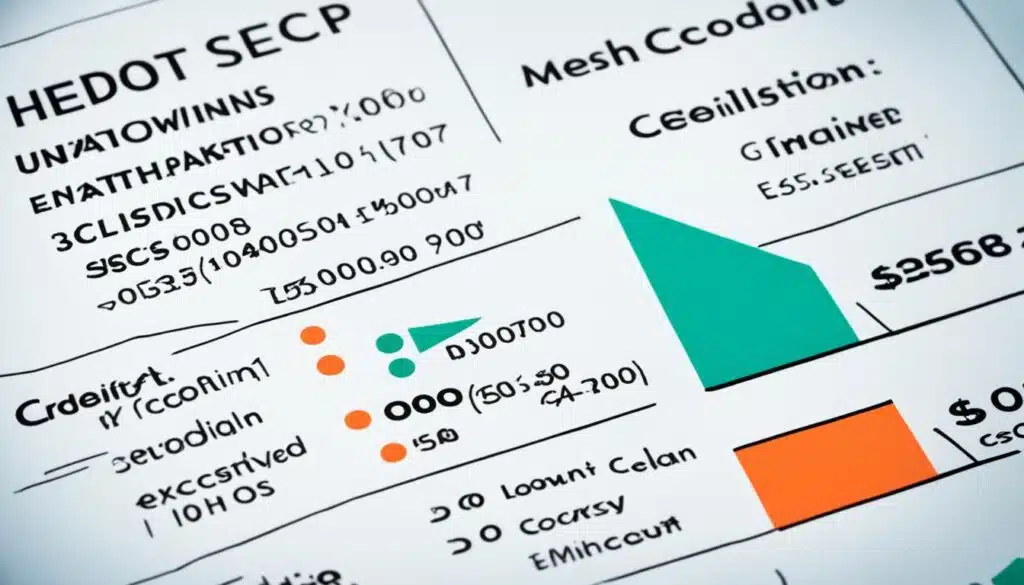Loan Consolidation Having many hard credit can be hard to handle and stressful. It’s important to find an easier way to manage them. Debt consolidation loan may be a great choice for simplifying your debt faster. By combining different higher-interest debt into one, you might get lower interest rates. This could lead to you paying less each month and improving your credit profile.
Homeowners can get questions about debt consolidation. This method is often backed by home equity lines of credit, offering lower interest rates than usual loans. There are two main ways to do this. You can either get a new, bigger mortgage that covers your existing debts. Or, you could take out a second mortgage, like a home equity loan, specifically to pay off your debts.
There are many upsides to using a mortgage for debt consolidation calculator. It could lead to paying less interest overall, making your monthly bills simpler, and boosting your credit. But, remember, it also has its risks. You might end up extending how long you’re in debt. Plus, there’s the chance you’ll lose your home if you can’t keep up with payments. Additionally, it’s crucial to consider consolidation loan rates when weighing your options.
Key Takeaways
- Debt consolidation loans allow you to combine multiple debts into a single, more monthly payment may be managed.
- Packing together debts like credit cards and personal loans for debt consolidation could mean lower interest, saving you money.
- The Federal Reserve is not directly involved in consolidating credit card debt, but its monetary policies can influence interest rates, which in turn may affect the terms and options available for consolidation. Typically, individuals consolidate credit card debt through methods such as balance transfers, personal loans, or debt consolidation programs offered by financial institutions or third-party companies. These methods vary in requirements and benefits, and individuals should carefully consider their options and consult with financial advisors before deciding on a strategy that best fits their needs.
- When you’re thinking about a debt consolidation loan, be sure to look into your credit, income, and other debts first.
- Combining your debts can show you’re handling your money well, which can improve your credit over time.
Understanding Debt Consolidation Loans
Debt consolidation is a strategy people use to manage their debts better. It can help lessen the number of debts and might lower interest costs. The main idea is to combine various debts into one loan. A consolidation loan is a type of loan used specifically for this purpose.
What is a Debt Consolidation Loan?
A debt consolidation loan combines all your debts into one, like credit card bills and car loans. By getting a new loan, you might lower interest payments and have just one easy monthly payment.
How Debt Consolidation Works
To consolidate your debts, you get a new loan from a bank, credit union, or online lender. After you’re approved, this new money pays off your old debts. Then, you only have to make one payment each month.
With debt consolidation, borrowers with fair credit aim to make handling debts easier and save on interest. If the new loan has a lower interest rate than your old debts, you can slash what you owe. This speeds up your journey to being debt-free. While the Federal Reserve doesn’t directly oversee debt consolidation, its policies can influence interest rates, impacting the options available to borrowers seeking to consolidate their debts.
Is Debt Consolidation Right for You?
Debt consolidation is good for people juggling many high-interest debts. It makes managing money simpler and can save on interest. Yet, it’s key to pick the right option by looking at your financial situation and the available loans. For individuals with bad credit, debt consolidation options may be more limited, but there are still possibilities to explore, such as secured loans or debt management programs.
Benefits of Loan Consolidation
Loan consolidation helps to get a get a lower rate of interest. This means you pay less in interest in the long run. High rates on credit cards and loans can make debt grow fast. Lower interest rates are usually on loans like mortgages or personal loan to consolidate debt. Putting all your debts into one can make these rates apply to your debt too. Your monthly payments could drop, and you save money on interest over time.
Lower Interest Rates
Consolidating loans turns many payments into one easy one. This can make life less stressful and help you keep track of bills better. It also plays a part in boosting your credit score, though the process may affect your credit temporarily as new credit inquiries and changes in credit utilization are factored in by credit bureaus.
Simplified Monthly Payments
Consolidating your loans can make paying bills simpler. One payment instead of many can prevent missing due dates. It lets you focus on other things, giving peace of mind.
Improved Credit Score
Bringing your debts together can make it easier to manage. This shows lenders you handle credit well. That means a bonus for your credit score.
Loan Consolidation Eligibility and Requirements
 To qualify for a debt consolidation loan, you need to meet certain conditions. These include your credit score, credit history, and income level. Lenders will also consider your employment status and the amount of existing debt. Additionally, having the ability to pay off your loan early can be a favorable factor in the approval process.
To qualify for a debt consolidation loan, you need to meet certain conditions. These include your credit score, credit history, and income level. Lenders will also consider your employment status and the amount of existing debt. Additionally, having the ability to pay off your loan early can be a favorable factor in the approval process.
Credit Score and Credit History
Your credit score and history are key. Lenders check these to see if you’re good at handling credit. If your scores are high and your record is clean, you have a better chance of getting a loan with good terms.
Income and Employment Status
How much you make and if you have a job matter too. Lenders want to be sure you can afford the loan. It helps if you have a steady job and don’t have too much debt already.
Debt-to-Income Ratio
Your debt compared to how much you earn is important. Lenders want to know you can pay back what you owe. Having a low debt-to-income ratio makes getting a loan easier.
| Eligibility Criteria | Favorable Factors | Unfavorable Factors |
|---|---|---|
| Credit Score | Excellent credit (760+) | Poor credit (below 650) |
| Credit History | Long, positive credit history | Limited or negative credit history |
| Income | Stable, consistent income | Irregular or low income |
| Debt-to-Income Ratio | Low DTI (below 43%) | High DTI (above 50%) |
Choosing the Right Loan Consolidation Option
Debt consolidation offers choices between traditional lenders like banks or credit unions and online lenders. Each has unique benefits and considerations to think over before choosing.
Traditional Lenders vs. Online Lenders
Traditional lenders might need a better credit score and income for their loans. They offer a personal touch and a wide variety of loans. On the flip side, online lenders are easier to qualify for and have a smooth application process. Yet, they might not offer as much flexibility in their loan terms or how long you get to pay back.
Loan Terms and Repayment Periods
When picking a debt consolidation option, think about how long you’ll have to pay and the terms. Longer loans can mean smaller monthly payments but more interest overall. Decide what balances saving money with paying off your debt sooner.
| Loan Terms | Potential Benefits | Potential Drawbacks |
|---|---|---|
| Longer Loan Term |
|
|
| Shorter Loan Term |
|
|
By looking at the choices and what they each offer, borrowers can choose wisely. This decision should fit their financial goals and plan for managing debt for as long as you pay.
Also Read : How Specialized Loan Servicing Can Save You From Financial Distress
Loan Consolidation Process
The journey to debt consolidation begins by seeking a consolidation loan from a loan lender, either from a bank or online. You will need to provide your personal and financial information, which includes details about your employment, income, credit score, and existing debts. Consulting a credit counselor may also be beneficial during this process. Loans come in various forms, so it’s essential to explore your options and find the best fit for your financial situation.
Applying for a Loan
When you apply for a loan to consolidate your debts, you need to provide detailed information about your financial situation. Lenders will review factors such as your credit score, types of debt, income, and overall earnings to determine your eligibility for a loan. Debt consolidation can help by potentially offering better rates and terms, which depend on these financial details.
Paying Off Existing Debts
After your loan gets the green light and the cash is in your hand, you can start wiping out your old debts. This could be credit card debt, personal loans, or any save money and pay the money you owe. Now, instead of many due dates, you have one easy-to-remember day every month to knock out a payment.
Making Payments on the Consolidation Loan
It’s not over yet; time to focus on those monthly consolidation loan payments. Sticking to these is key for your overall debt management plan. Come up with a budget and plan to pay on time. Newsflash: These new monthly bites might even be smaller than what you were trying to chew before. Punctual payments will also start the journey to a better credit score.
FAQs
Q: What is debt consolidation?
A: Debt consolidation is the process of combining multiple debts into a single loan, especially for individuals with bad credit, in order to streamline your finances and make it easier to manage your debt, ultimately aiming to become debt-free.
Q: How does a debt consolidation loan work?
A: With a debt consolidation loan, you take out a new loan to pay off your existing debts. This leaves you with one to repay a loan, usually at a lower interest rate.
Q: What are the benefits of consolidating my debts with a personal loan?
A: Consolidating your debts with a personal loan can help you simplify your finances, lower your interest rates, and potentially save money in the long run, especially when it comes to credit card balances.
Q: Will getting a debt consolidation loan affect my credit score?
A: Taking out a debt consolidation one loan can affect your credit score in the short term, but if you make timely payments, it can have a positive impact on your credit over time.
Q: How do I know if a debt consolidation loan is the right option for me?
A: Consider factors such as your current debt in minimum loan amount, interest rates, and repayment capabilities to determine if a debt consolidation loan is the best solution for paying off debt in your financial situation.
Q: Can I use a personal loan to consolidate my debts?
A: Yes, personal loans can be used for debt consolidation purposes. Make sure to compare loan rates and terms to find the best option for your needs.
Q: What are the best debt consolidation loans available?
A: Research and compare different lenders to find the best debt consolidation loans that offer favorable terms, low interest rates, and flexible repayment options.





